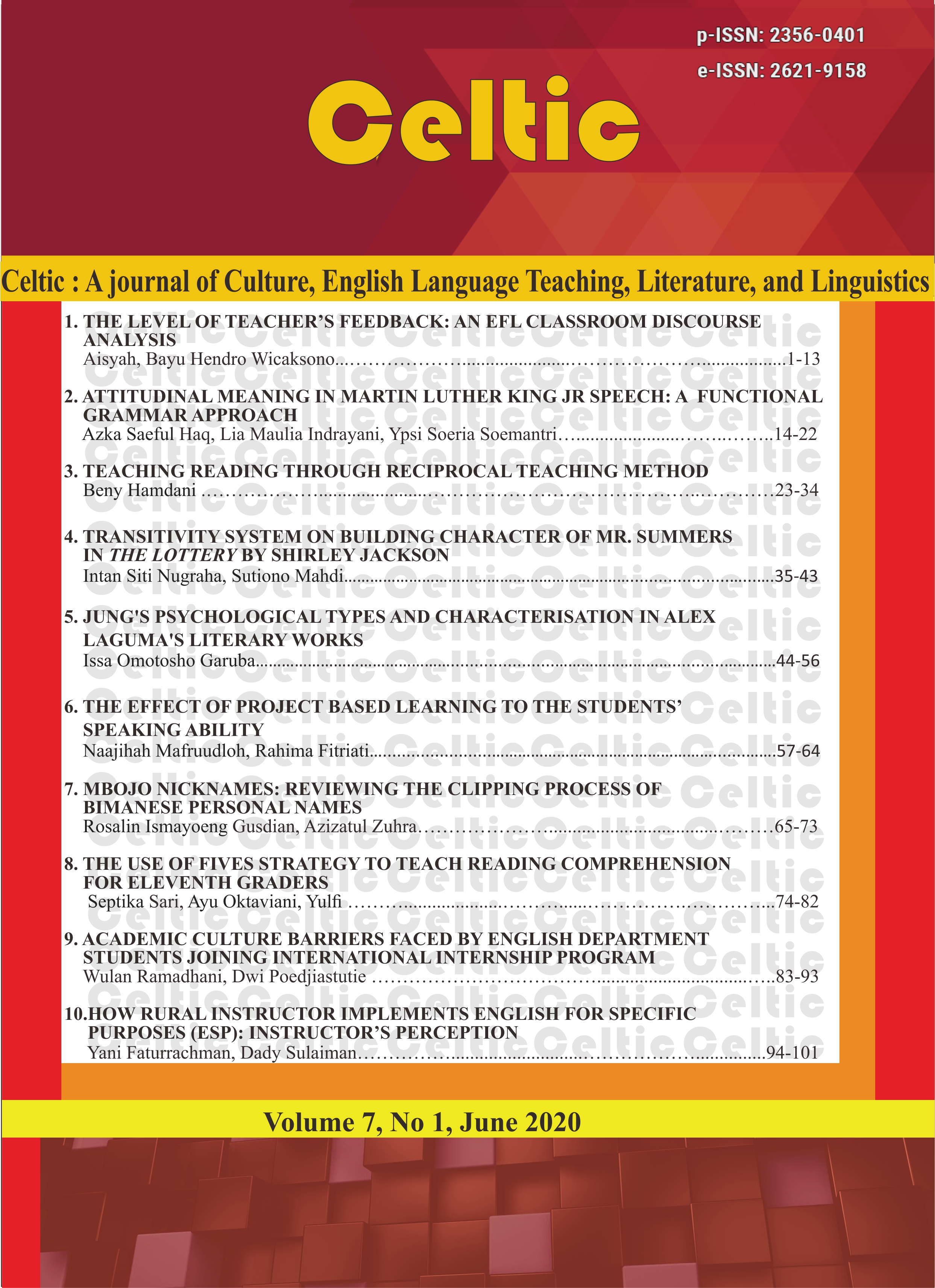THE EFFECT OF PROJECT BASED LEARNING TO THE STUDENTS’ SPEAKING ABILITY
DOI:
https://doi.org/10.22219/celtic.v7i1.12203Keywords:
ESP, PBL, Speaking AbilityAbstract
Project based learning (PBL) is an appropriate and applicable learning method in all levels of education. In this method, the lecturer acts as a facilitator or the one who takes a main role in teaching and learning process. The aim of PBL is to solve problems and develop students’ critical thinking. It also encouraged the students’ way of thinking in doing or creating something. This method was implemented in English for Management class at. It was expected to make the students to be more creative facilitated by a discussion, sharing, and collaboration work. The aim of this study was to describe the implementation of PBL in non-English department class (Management department class) and to know the effect of PBL in students’ speaking ability. There were 25 students selected as the sample. The methodology used pre-experimental design. Data were collected by observation to answer the first research question and test to answer the second research question. The acquired quantitative data were analysed statistically by paired sample T-test. The research found a significant effect of PBL to the students’ speaking ability. It was also an effective methodology in teaching speaking because it made the students to be more active and innovative in doing the task and joining the class. Thus, it is strongly recommended to apply this teaching method in speaking class as an alternative way to improve students’ speaking competency.
Downloads
References
Abdulaziz, M. S. (2012). Change from a General English Teacher to an ESP Practicioner: Issues and Challeges in Pakistan. Jurnal contemporary Research in Bussines, 9, pp. 1-12.
Aldabbus, S. (2018, March). PBL: Implementation and Challenges. International Journal and Education, Learning and development, 6, 71-79.
Baş, G. (2011). Investigating The Effects of Project-Based Learning on Students’ Academic Achievement and Attitudes towards English Lesson. The Online Journal Of New Horizons In Education, 1, 1-15.
Cintang, N. S. (2018, February). The obstacles and Strategy of PBL Implementation in Elementary School. Journal of Education and Learning, 12, 7-15.
Creswell, J. (2014). Researcg Design: Qualitative, Quantitative, and Mixed Method 4th Edition. USA: SAGE Publication.
Gültekin, M. (2005). The Effect of PBL on learning Outcomes in the 5th Grade Social Studies Course in Primary Education. Educational Sciece: Theory and Practice, 5, 548-556.
Hartatik, S. F. (2016). Project Based Learning : an Offered solution for Speaking Class. Celtic, 2.
Hedge, T. (2008). Teaching and Learning in the Language Classroom. Oxford: Oxford University Press.
Ibrahim, A. M. (2010). ESP at the Tertiary Level : Current Situation, Aplication, and Expectation. English Language Teaching, 3, 200-204.
Ichsan, M. H. (2016). media.neliti.com. Retrieved March 10, 2020, from https://media.neliti.com/media/publications/213975-none.pdf
Khoiriya, S. R. (2015, June). Project Based Learning Method in Teaching English Speaking Skill for Grade 11 of SMAN 3 Malang. Celttic, 2, 59-72.
Railsback, J. (2002). Project Based Instruction: Creating Excitement for Learning. Oragon: Northwest Regional Education Library.
Rochamwati, P. (2015). PBL to Raise Students' Speaking Ability: Its' Effect and Implementation ( A Mix method Research in Speaking II Subject). Koodifikasia, 9(1), 200-221.
Simpson, J. (2011). Integrating PBL in an English Language Tourism Classroom in a Thai University. Australian catolic University: Unpublished Disertation.
Thomas, J. (2000). A review of Research Project based Learning. San Rafael, California: Autodesk Foundation.
Downloads
Published
How to Cite
Issue
Section
License
- Authors retain copyright to publish without restrictions and grant the journal right of first publication with the work simultaneously licensed under a Creative Commons Attribution License that allows others to share the work with an acknowledgement of the work's authorship and initial publication in this journal.
- Authors are able to enter into separate, additional contractual arrangements for the non-exclusive distribution of the journal's published version of the work (e.g., post it to an institutional repository or publish it in a book), with an acknowledgement of its initial publication in this journal.
- Authors are permitted and encouraged to post their work online (e.g., in institutional repositories or on their website) prior to and during the submission process, as it can lead to productive exchanges, as well as earlier and greater citation of published work.














